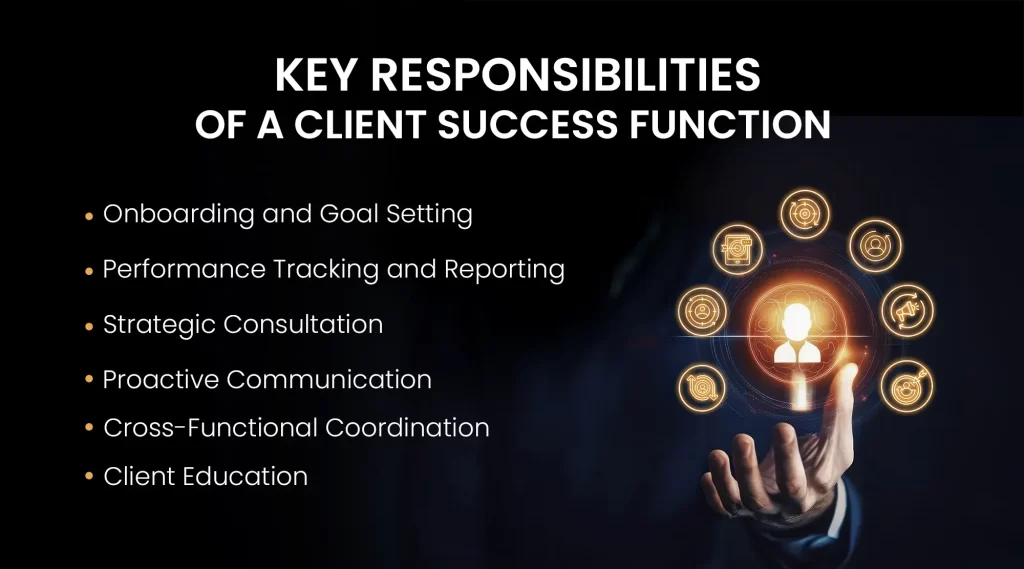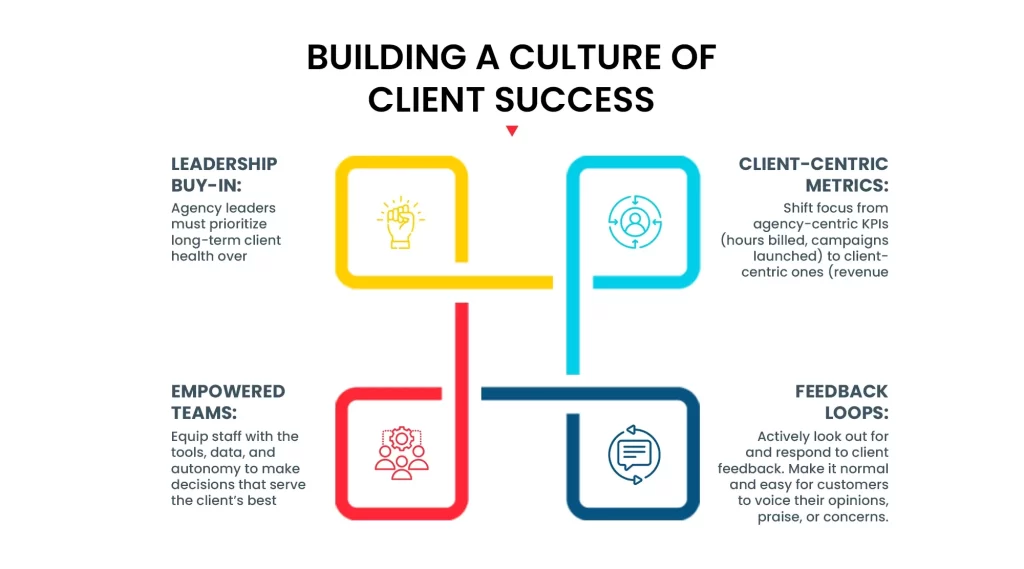Advertising agencies can’t rely just on media buying power and creative skills in today’s dynamic and highly competitive market. Building profitable, long-lasting relationships with clients requires agencies to concentrate on one crucial area that is often ignored: Client Success.
The idea of CS originated in the SaaS industry, where a customer’s success is closely linked to the adoption, retention, and growth of a product. However, advertising agencies have begun using the same principles to build trust, provide accessible value, and ensure that their clients meet their marketing goals.
Let’s look at what customer success in advertising means, why it matters, and how it serves as an important pillar for expansion and maintenance.
Understanding Client Success In An Advertising Agency

In an advertising agency, “client success” refers to the active strategy of making sure a client uses the agency’s services to achieve the results they want. It extends beyond traditional account management, which often focuses on communication and project delivery. Value delivery, partnership development, and strategic cooperation are key components of CS.
Although account managers frequently serve as the client’s point of contact with the agency, a CS team or mindset confirms that the agency’s work continuously improves the client’s overall business goals. This involves closely collaborating with clients to understand their long-term objectives, difficulties, and KPIs, and then organising agency resources to support those results.
Why Customer Success Matters In Advertising?
In the advertising industry, customer success is extremely important since it has a direct impact on the agency’s growth, reputation, and long-term sustainability. Here’s why it’s so important:

1. Retention and Lifetime Value
Getting new clients is expensive and time-consuming. The lifetime value of existing clients to the agency is increased when they are satisfied, successful, and supported. A strong CS plan helps agencies in protecting lasting relationships, which results in steady income flow and a stronger portfolio.
2. Client Advocacy and Referrals
Happy customers turn into advocates. In addition to expanding their area of expertise, they are more likely to recommend the agency to others and talk favourably about it in business environments. In a field where reputation is crucial, a successful client is a living example, and that is priceless.
3. Reduced Churn and Misalignment
Churn is frequently caused by unfulfilled expectations or a lack of perceived value. Customer success teams can identify red flags early, actively tackle dissatisfaction, and coordinate efforts to maintain relationships on track by focusing on success metrics and conducting frequent check-ins.
4. Stronger Results and Case Studies
Case studies and public success stories are more likely to feature clients who, with the agency’s help, achieve measurable business outcomes. In addition to increasing the agency’s trustworthiness, this also helps it draw in new clients.
Key Responsibilities Of A Client Success Function
Customer success is a philosophy that can be formed in the culture of the agency rather than a single position. Still, a lot of agencies create specialised CS teams or assign these duties to account or project managers. A strong team function usually includes the following:

1. Onboarding and Goal Setting
A systematic onboarding procedure is the first step in the client journey. The agency’s thorough knowledge of the client’s business, target audience, goals, and expectations is ensured by customer success. There are well-defined KPIs and a collaborative definition of success.
2. Performance Tracking and Reporting
Successful client campaigns require constant performance evaluation of factors like creative resonance, ROI from media expenditures, and campaign efficacy. The emphasis is on insights and results rather than number reporting. How did it work? But what didn’t? Now what?
3. Strategic Consultation
Clients want guidance, not just execution. CS ensures that the agency offers strategic advice based on performance data, market trends, and the changing needs of the client. This can involve suggesting new media outlets, modifying messaging, or reconsidering media distribution.
4. Proactive Communication
Strong customer success is defined by frequent check-ins, performance evaluations, and strategic meetings. These are cooperative meetings that strengthen alignment and promote mutual development, not merely status updates.
5. Cross-Functional Coordination
To guarantee that campaigns work together and in line with client objectives, CS teams frequently collaborate across the creative, media, analytics, and digital departments. They serve as the binding agent that maintains internal teams’ focus on the client’s broader goals.
6. Client Education
Education is an essential but often ignored part of customer success. Clients gain more confidence and are able to make better decisions when they receive assistance in understanding digital platforms, attribution models, campaign strategies, and consumer behaviour.
Building A Culture Of Customer Success
For agencies looking to embed CS into their DNA, it requires a cultural shift:

Final Thoughts
Client success has been recognised as an essential factor for an advertising agency in a time when consumers have more options than ever before and demand more from brands than just appealing advertisements. It’s not only about producing excellent work; it’s also about producing the appropriate outcomes, regularly and cooperatively. In addition to keeping more clients, agencies that prioritise customer success will create collaborations that produce better work, better results, and a more viable business plan.
Also Read: How Mobile Advertising Is Redefining App Performance in 2025?
FAQ
Q. What is ‘Client Success’ in the context of an ad agency?
A. In an advertising agency, “client or customer success” refers to a specific department or group that makes sure customers get the results they want from the agency’s services.
Q. How is Customer Success different from Account Management?
A. Although both positions develop relationships with clients, Account Management often focuses on project execution, budgets, and schedules. In contrast, Customer Success is more outcome-oriented and strategic.
Q. Why is CS considered the “unsung hero” of ad agencies?
A. CS teams often work in the background, ensuring that campaigns achieve their goals, resolving problems before they become more serious, and speaking up for clients within the company.

